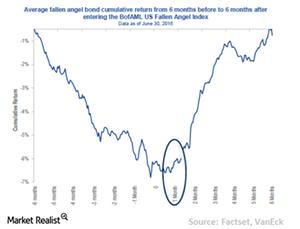How Fallen Angels Could Reward Investors
Fallen angel bonds—high-yield bonds originally issued with investment grade credit ratings—are generally known for offering potential value. A big source of this value has been the tendency of fallen angels to be oversold below what may be considered fair value, leading to a downgrade to high yield. A less obvious source of value for fallen angels […]
July 20 2016, Updated 11:49 a.m. ET

Fallen angel bonds—high-yield bonds originally issued with investment grade credit ratings—are generally known for offering potential value. A big source of this value has been the tendency of fallen angels to be oversold below what may be considered fair value, leading to a downgrade to high yield.
A less obvious source of value for fallen angels can arise, however, when the underlying corporation engages in a bond buyback, typically in the form of a public tender. Bond buybacks are a form of “liability management” that can help companies tidy up their balance sheets, improve their credit standings and ratings, and attract and retain investors. Companies use buybacks either to retire debt at a discount or to reduce costs simply by buying back a higher yielding bond and then issuing a new bond at a lower interest rate.
The above chart is for illustrative purposes only.
Market Realist: fallen angel bonds offer potential value
As the name suggest, fallen angels (ANGL) are high-quality, investment-grade rated bonds that have fallen steeply in price and have now acquired junk bond status. The fall from investment grade to junk status might be due to various reasons, including worsening financial condition of the issuer.
According to estimates by JPMorgan Chase (JPM), bonds worth $140 billion attained fallen angel (MT) status in the first quarter of 2016, mainly due to the fall in commodity prices (GSG). About 20 out of 26 fallen angels in the first quarter were companies in the energy, metals, and mining sector (COMT).
Rating agencies downgrade such bonds due to sharp declines in revenues, profitability, and uncertain market conditions. In addition, rising debt along with deteriorating financial health, which hampers issuer’s debt servicing capabilities, could be a definite reason for a credit downgrade.
Tendency to be oversold
Fallen angels can be an excellent turnaround story and could reward potential investors. On the other hand, they could fall further and continue on a downward path. Value investors often find long-term opportunities in fallen angels because they capitalize on the potential turnaround of a company. Mostly, fallen angels are available below their perceived fundamental fair value because fund houses have to offload investment-grade companies when they attain junk status because of certain restrictions in the fund rules.
Value in bond buybacks
Bond buybacks by an issuer can be another source of value creation for fallen angels. Issuers buy back their bonds for a variety of reasons, including potential financial turnarounds. The buyback could be a sign of growing confidence by a company in any potential improvements in their business fundamentals.
